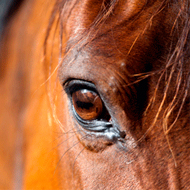Small red worm is the most common worm to be found in the UK.
Horses at serious risk from small red worm
One in three horse owners are worming incorrectly, putting their horses at serious risk from encysted small red worm damage, according to figures released from the latest National Equine Health Survey (NEHS).
All horses should be wormed for encysted small red worm during the months of November and December, even if they have a negative faecal worm egg count.
However, this years' National Equine Health Survey revealed that 29 per cent of horse owners who thought they had treated for this fatal parasite had used a product which was not actually indicated to treat them.
Small red worm is the most common worm to be found in the UK and it can be fatal in the encysted stage. Often owners don't know their horse has them because they don't show up in feacal worm egg counts or cause any obvious symptoms.
Only two active ingredients are licensed to treat the parasite: a five-day course of fenbendazole or a single dose of moxidectin. However, resistance to fenbendazole is now widespread in the UK, so experts recommend carrying out a resistance test beforehand.
The survey revealed that 64 per cent of horse owners who specified how they treated for the parasite had correctly used moxidectin either on its own or in combination with praziquantel (compared with 71 per cent in 2014).
Seven per cent had used fenbendazole. However, of the remainder, 22.5 per cent had used ivermectin, and just over six per cent had used products licensed for tapeworm treatment.
Commenting on the figures, equine veterinary manager Wendy Talbot said: “Encysted small redworm are potentially the most harmful parasites to affect horses in the UK yet the survey results show consistent confusion over the correct product to use to minimise risk.
"It is imperative for owners to discuss their worm control plan with their vet or SQP and use the right product at the right time to safeguard their horses’ health.”







 The latest
The latest 
